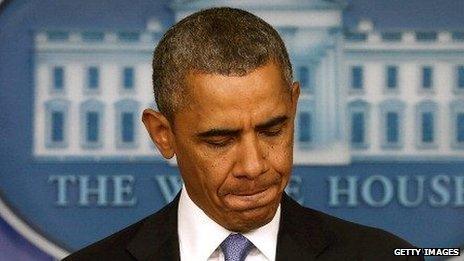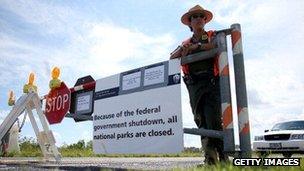Shutdown showdown: Have the Democrats already lost?
- Published

President Obama and the Democrats are fighting the shutdown battle on Republican ground
The Democratic Party has beaten back every attempt to dismantle healthcare reform, while Republicans have been divided over strategy. But with a budget debate focused on conservative priorities and inconclusive poll numbers, while congressional elections remain a long way off, do Democratic claims of victory ring hollow?
Spirits are high in the Democratic Party more than a week after the start of the government shutdown. "We are winning," a senior administration official said to the Wall Street Journal, external. Representative Jim McDermott of Washington state told Slate, external that Republicans "have lost, and they can't figure out how to admit it".
But behind that rhetoric lies an uncomfortable truth for some: the entire budget showdown is being fought on Republican terms.
Even if the Democrats get what they want - a "clean" continuing resolution funding the government and a vote to raise the debt ceiling - conservatives will end up ahead, thanks to the results of debt limit negotiations two years ago.
Playing offence
The Senate has committed to conservative-supported spending levels set in January by the sequester - deep cuts to domestic and military spending enacted after Democrats and Republicans failed to reach a budget compromise in 2011.

Representative Jim McDermott says Republicans have to admit they lost
"The Republicans have pocketed that number and pivoted back to deficit reduction," says Robert Borosage, co-director of the progressive advocacy group Campaign for America's Future. "It now appears as if Democrats are just beginning negotiations instead of everyone realising they've already made concessions."
Bryce Covert, economic policy editor at the liberal blog ThinkProgress, says that unless Democrats start aggressively pushing their priorities, they may win the shutdown battle but lose the policy war.
"If the Democrats don't play offence and get past this defensive crouch, they will never be able to advance their vision," Ms Covert says. "They've got to set goalposts and delineate the field of argument, not just for now, but for the future."
Democrats should be talking about things like universal preschool care, raising the minimum wage, and paid family leave, Ms Covert says. That way, when President Barack Obama enters talks with Republicans, Democrats will be less likely to end up with the kind of uneven compromise that progressives feel Mr Obama has agreed to in the past.
"We've been through a lot of crisis battles like this since 2010 - the Democrats start out strong, and the end result is capitulation," Ms Covert says. "Republicans have been very effective in winning spending cuts over and over again."
Poll blame
Democrats have been encouraged by recent public opinion surveys. Party supporters were buzzing over a Quinnipiac survey, external giving a generic Democrat a 43% to 34% lead over a generic Republican in the 2014 congressional elections - a margin large enough to suggest Democrats could regain control of the House of Representatives.
But generic matchups don't take into account the advantages of Republican incumbents and the demographics of congressional districts, and they mean little if Democrats fail to field competitive candidates.
So far, while polls show Republicans shouldering more blame for the shutdown, Democrats have not achieved the sort of decisive margin in surveys that President Bill Clinton had during his shutdown confrontation in 1995.
"The advantage for Clinton was much more clear-cut - 20 points or more, early in the shutdown," says Carroll Doherty, associate director of Pew Research Center for the People & the Press, which has surveyed extensively on the shutdown.
"In every poll that's been done, there's a modest plurality view that Republicans are more to blame. It's not overwhelming."
Meanwhile, independent voters - who often decide the outcome of elections - are blaming both sides equally.
Mr Doherty says that the latest Pew survey, external asked who was at fault for the shutdown, and 24% of independents named both sides - even though that wasn't a provided response. "Independents are more or less saying, 'a pox on both houses,'" he says.
A distant election
Democrats shouldn't expect any advantage to hold until the 2014 midterm congressional elections, more than a year away. Even after the 1995 shutdowns, both parties had recovered their standing by the time election day arrived.

Polls show independent voters blame both parties for the shutdown
"Any talk about 2014 is just speculation at this point," Mr Doherty says. "The polling so far is very focused on the short-term, and not how much it's affecting the Democratic and Republican brands."
Voters in 2014 are going to be angry and looking to punish someone, Mr Borosage says.
The Democrats, as the party with the presidency, will have to work hard to focus public ire on Republicans.
"Next November, we'll have an economy that's not very good, with declining wages and low employment," Mr Borosage says. "The coming debate is going to frame the perception of who's to blame."
If Democrats lose the policy battle and underperform in the 2014 elections, today's "winning" will end up looking a lot like defeat.